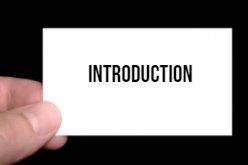Teach Teens to Discern
Teach Teens to Discern
Our days
are filled with
attempts by the world
to manipulate our opinions.
Let's arm our teens with help.

What you learn
on this page
will help your teens -
and maybe even you !

Consider
"It's easier to fool people
than to convince them they've been fooled."
Mark Twain

Our Teens
need
wisdom & logic.
Let's teach our teens wisdom and logic.
Let's prepare our teens
for
the manipulative techniques they will encounter.

A
Helpful
First Video
The above video highlighted
The Bandwagon fallacy - Everybody is doing it or buying it so it must be great.
Testimonial fallacy - A famous person is endorsing something so it is great!
Plain Folks - Showing ordinary people using something. Politicians eating at a Fast Food Restaurant makes them look like plain folks. We trust a politician more if we think he or she acts like we do.
Transfer Technique - Trying to take something (like a cute pet) and associate it with the thing the company is advertising. Another example - In a commercial, if you can wear a lab coat, it makes people think you are trustworthy.
Using fear to influence. It is wise to think things through and not just make decisions from our emotions. Using emotions to influence is sometimes called Appeal to Emotion.
Take Note:
When you are feeling stirred to give an emotional response,
clear thinking is hindered.

Beth who wrote this page says...
I wish I had the information on this page
when I was a teenager.
When I was a teenager and even well into my adult years ...
I believed that
when
I was listening to "the news"
I was only hearing facts.
But
news stations
and radio stations
are businesses that want to please advertisers.
And
news & radio stations
have leadership
who have
strong political views that they want to promote.

And - I also believed -
Scientists always give us truth that we can rely on.
But
scientists
make mistakes
and
some of them
have
very
strong opinions
that they try to promote by skillfully slanting information.
And some scientific organizations
won't allow research on topics that are not popular.

And I used to believe -
Medical doctors know everything
and
can't be wrong.
But
medical doctors
are human and very busy.
They rely on "scientists" and
"medical leaders in their organizations"
to give them accurate information.
And
I wish when I was young,
I thought more about
the manipulation
that comes with all the commercials I was watching.
Thinking
logically and carefully
is not automatic.

Consider
The Bible says,
"Any story
sounds
true
until someone
tells the other side and sets the record straight."
Proverbs 18:17 TLB

Logic
is a needed defense to protect us
from
good-willed people who are incorrect,
and from
being
taken advantage of,
unfairly influenced,
or deceptively fooled.
~ ~ ~
Thinking logically helps us make
good choices.


Next
let's look at the technique of
Appeal to Emotion
The above commercial
creates fear
just
a little bit of fear
about
what will happen if you don't buy Duracell Optimum.
It creates a slight emotional response
and uses it
to
implant in our mind that
"if I buy Duracell Optimum, I will protect myself against
unwanted outcomes."
Repetition is Powerful.
Companies want us to see
their commercials multiple times.
Next
let's quickly look at the
The Transfer Technique
It is taking something
(for example - our trust in firefighters)
and associating it with the thing the company is advertising.
This second Duracell commercial
uses this technique.
The Transfer Technique
You trust firefighters.
Firefighters trust Duracell.
Therefore you should trust Duracell.

Logical
Fallacies
The above video highlighted
False Cause - The dinosaurs age vegetables and they are extinct.
Straw Man Argument - it is often used in debating. In this technique, someone takes an argument of their opponent and misrepresents it so it is easier to attack and appear to win the argument. This argument is also often used by biased journalists.
Begging the Question - A type of circular argument where someone includes their conclusion as a part of their reasoning.
Example: The Law should be followed because it is illegal to break it.
Example: Our product is the best because we only sell high-quality items.
Video on Begging the Question https://youtu.be/VXoSHv1GP4I?si=LlwLKxXNGf0QCl5x
False Dilemma - My friend doesn't answer the door - so he must not be home.

The
First Technique
I'll highlight in depth
is
called
Name Calling or Ad hominem Attack.
We see this a lot in politics.
We also see it used
by
teenagers
trying to control others.
It is used a lot
because
it persuades
lots of people
who aren't paying close attention.

In politics,
an
ad hominem attack
is used to verbally attack the other person
instead of
attacking
the idea the other person is presenting.
|
verbal arrows |
 |
This technique
can be used out of frustration but it is
generally used
to try to
divert listeners from focusing on the issues.
Often a person uses this technique
because
the person thinks that
he or she
cannot
win over listeners
by logic
so the person
reverts
to name - calling.
Take note
of the people you see who are name - calling.
Ask yourself -
Do these people
use this fallacy
try to win people toward themselves
and away
from another opinion?
Ask yourself -
Are these people
open and eager to debate?
Or
do they just want to call a person bad names?
Ask yourself -
Do these people want to share the
logic
behind their opinions?
Or
do they just want
to
dirty the name
of
those who oppose them
or
those who feel like a threat to them?

Teen Situations
This technique
can
even be used in
a teen situation.
An example might be
where one teen
(I call person A)
feels threatened by a Christian teen.
The Threat might be
that ....
Person A - who is a Bully - is
worried that
the Christian teen might convince
person A's friends
to become more Bible - oriented.
So person A
feels that
he or she might lose those friends to Christianity.
So the Christian is seen as a threat.
This results
in name - calling and sometimes worse.

Sometimes teens
are put in a position of being alone.
Being alone does not feel good.
But - it is temporary.
And note that
we show our love for God,
when we do not compromise our faith.

Another Teen example
Calling someone a "bad" name
is a technique used
to win an argument
by
intimidating another person into silence
instead of
trying to logically show that he or she has the best ideas.
Note:
Teens might be likely to observe
political
name - calling
when watching a
gun-control debate.
Both sides are very tempted to use name - calling.

Wisdom Says...
When a group of your peers
continually uses name-calling,
look deeper into the situation.
Don't let the threat of being called a name
keep you
from making wise decisions.

For example,
if
teens say words to you
that essentially tell you -
"If you don't join our group, you will be labeled as....
(boring or stupid or uncool or a Christian kook) "
don't let
your emotions
direct your decision.
My friend Carl often says,
Emotions should provide awareness,
but not necessarily direction.
Carl Smith
Next
I'll highlight the
Bandwagon Fallacy
Consider the following commercial
-
What type or types of logical fallacies are being used?
More about Commercials
Part of this page includes
highlighting
HOW
ads try to
influence or manipulate us
to buy things.
-
Commercials often imply -
"This product will make you FEEL happy!"
Which is an
Appeal to Emotion.
This next video
gives insights
into advertising.

There are words and phrases
(and pictures that represent these words and phrases)
that
ad companies use to draw us to buy.
For example...
"You deserve it."
"The popular people buy this."
"This product makes life more fun."
"You are missing out by not having this product."
"Everybody is getting it."
"You'll never be happy, unless you buy this."
"You will be ostracized if you don't have one."
Advertisers do not want you
to think logically
about a purchase.
They instead encourage you
to let your emotions decide what to purchase.
Ad companies work hard to -
Stir your emotions!

You can GAIN insights from
every message of
persuasion
by meeting the message with 3 questions:
1.
What do they want me to feel?
2.
What do they want me to do?
3.
Who gains by me feeling 'this' or doing 'this' ?

When making important decisions,
it is wise to use
Critical Thinking.
-
Critical Thinking is Careful Thinking.
Critical Thinking means -
being able to clarify your thinking so that you can break down a problem or a piece of information, interpret it and use that interpretation to arrive at an informed decision or judgment.
The above definition came from...
https://www.monash.edu/student-academic-success/enhance-your-thinking/critical-thinking/what-is-critical-thinking
When we need to figure out
if
an argument is
true or false -
we need to do
critical thinking.

It is important to ...
Ask Questions.
Check facts that are presented to you.
Think for yourself before agreeing with an idea or buying something.
Be open to hear views of those who might disagree with you. (Those people might have some good points.)

The
Second Technique
I'll highlight
in depth
is called
Appeal to Authority.

Appeal to Authority
is
trying to persuade by saying
that a certain theory or belief
is right
because such and such person
with high educational degrees or honorary titles
or some other kind of prestige in the community
believes it is right.
(Appeal to Authority is often used in advertising.)

For example:
This technique essentially says that...
He has a Ph.D.
He cannot be wrong.
Or
She is a medical doctor.
She cannot be wrong.
Or
That person is a scientist.
A scientist cannot be wrong.
Or
That person has a huge internet following.
A popular person cannot be wrong.
After all....
How can that person possibly be wrong ?

We get lots of pressure
from people
who use their "education" to confidently tell us
that we MUST believe what they say.
People sometimes say or imply,
"I'm correct because I have more degrees than you,
or I have lived longer than you,
or because people call me an EXPERT."
-
Some imply it with a questionable attitude.

Here is a medical example.
Introduction
Even if
the majority of medical doctors think a certain way -
they can be wrong.
We need to examine facts
if
we are thinking about
an important medical decision.

When I was in public school,
my science teacher laughed
about the time in history
where doctors took leeches
and
put them on patients.
She mockingly told us -
"That was a respected medical technique!"
Then when I was in my 40's,
I turned on my desk-top computer to get into my e-mail,
and
I saw a headline that said -
Doctors think that
leeches
may actually
be a good medical choice for certain conditions.
And today
doctors sometimes use leeches.
See the articles below that I found today to illustrate this.
Cut & paste in browser.
https://www.britannica.com/science/leeching
https://www.uhhospitals.org/blog/articles/2020/03/how-leeches-can-save-lives-and-limbs-for-some-patients
My point is
When I was in public school,
teachers laughed
at using leeches.
But now
it is being done
just like in the "dark ages" of centuries past.
So...
it doesn't matter if the idea is old or new.
Therefore ...
let's evaluate the idea on its merits.
The next section highlights
LAUGHTER

Laughter
Laughter is a wonderful gift from God.
Yet
laughter is often used to manipulate people.
Be aware
when you see people using humor to mock someone.

One "humor" technique in a debate
is when a person
takes a sentence that the opposition has said and
repeats that sentence in a mocking tone
or
does an exaggerated, mocking impression of that person.
This is very effective because it is easy to do.
And this humor technique
can be combined with other fallacies for a greater effect.
For example,
this humor technique
is often used with
an ad hominem fallacy or a strawman fallacy or the
bandwagon fallacy.

We need to be alert to a person
using humor and sarcasm
to try
to get us to move our opinion about something.
Humor along with other logical fallacies like
Appeal to Authority
go together to become even more powerful.

And note that people influence our emotions
by speaking certain words to us.

Words such as
" Nobody would ever do such a thing "
are powerful movers of our emotions.
-
Take note if
someone
is trying to use emotional words
to make you think
that by
making a good decision,
you will be
isolated from the group.

As people spiritually mature,
they realize that
they will sometimes have to make
unpopular decisions
in order to make wise decisions.


More about Science
You will often experience people using the technique
Appeal to Authority
to try to influence you.
I submit to you that it is wise to remember that
Science Information
changes.
So I encourage you
to not be quickly swayed
by a commercial
that relies on medical experts or other authorities.
Instead,
use your critical thinking skills.
And
also consider
doing your own research -
if you think
the decision is an important one.

Examples of - Science knowledge > > changing
Here is an
example or "eggs - amble"
to remind you that Science is always changing.
Scientists
get things wrong ALL THE TIME.
Science is always changing.
For a simple example -
EGGS
During my life,
scientists
have changed their "truth" over and over
about the topic -
Are eggs good for you?
Answers have been:
Yes - then years later No - then years later
whites are ok but yolks are bad -
then years later eggs are good in moderation - and right now the subject is in flux and will probably change soon.
Each time the scientists' answer to that question was given to us earnestly as
"NOW we have the true answer. Previously we didn't know."
I've lived long enough to totally realize that
what "Science says" today,
will probably
be significantly or totally the opposite
of what "Science said" 20 years ago.
Here
is a July 2025 article
about a recent egg study.
Cut & Paste in browser:
https://studyfinds.org/eggs-can-help-lower-cholesterol-surprising-study/
It says,
For most healthy adults,
eating eggs as part of a diet low in saturated fat
appears not just harmless
but
potentially beneficial for cholesterol management.
Carter, S., Hill, A.M., Yandell, C., Wood, L., Coates, A.M., & Buckley, J.D. (2025). “Impact of dietary cholesterol from eggs and saturated fat on LDL cholesterol levels: a randomized cross-over study,” published in July 2025 edition of The American Journal of Clinical Nutrition, 122, 83–91. The study was registered at clinicaltrials.gov as NCT05267522.
More about Science
Another example:
Low - dose aspirin was heavily pushed by doctors for all senior citizens for years.
Yet about 10 years ago, I saw articles about prestigious medical studies that concluded that aspirin was shown to do nothing to prevent strokes or heart issues but it was shown to increase macular degeneration. I sent those articles to several senior citizens that I knew at the time.
However, today, there has been more research. So the current findings may be different. Today, it may show that aspirin is helpful to prevent strokes and heart issues.
Doing this page, I remembered that incident. So, I quickly found this article for you as another example of medical opinions of medical authorities not always staying the same.
The study linked below appears to say that aspirin may help some seniors but not others.
New studies sometimes show opposite results from older studies. By reading the article below, you may or may not think that low - dose aspirin is a good idea. The article below does not address macular degeneration.
cut & paste in your browser -
https://www.nih.gov/news-events/nih-research-matters/daily-aspirin-shows-no-benefit-healthy-older-adults
My point is that
doctors sometimes highly recommend something
that later is shown in tests
not to work
and sometimes later shown to even
be detrimental.
And note that
future studies might refute our current studies of today.
Science knowledge is always changing.
So -
people need to not only listen to their doctor
but also do their own research
and
make informed, prayerful choices.
Doctors are
human beings doing the best they can.
So reality tells me,
we are all responsible for our health choices.

The
NEXT Technique
I'll highlight
is called
The Strawman Argument
A strawman is a fake man put on a wooden post in a vegetable garden. It is used to try to make crows think a man is in the garden, and he is guarding the garden from them.

This technique
is when
someone takes an argument and misrepresents it
so
it is easier to attack.

A strawman
is a fake man instead of a real man.
So
this is about fighting a fake argument
instead of addressing the argument your opponent is presenting.
-
Next
A Strawman Argument example
A man preparing a menu
for a business breakfast meeting says,
" I think our group should have pancakes for breakfast."
A second man says,
" Oh, so what you're saying is that you HATE waffles."
At the end of the video
the boy says,
"You still haven't convinced me."
The man says,
"I'm not after you; I'm after them."
The man means that
he is trying to change the minds of people who listen
to the two of them debate.
The man is saying that
he knows he can't change the boy's opinion
but
he can sway others who are listening
to think
he won the argument
if
he can win the argument of a different issue.
~ ~ ~
When someone does not want to lose a debate,
he or she is often heard using the strawman technique
in order to appear to have won.
Could it be that "Pride" is often part of the reason
someone uses the "strawman argument"?
PRIDE

Strawman
video example
Notice that the little boy is grinning.
He knows this is all pretending - and they are being playful and fun.
Another quick
Strawman video
Strawman Arguments
are often used
during
political
discussions and debates.
Consider watching
a news show that features
two opposing opinions
and notice
if
you hear anyone using a Strawman Argument.
And -
Listen for
other logical fallacies as you listen to the
two sides.

The News
Teens and adults
often need
some tips and insights
to protect them
from being unknowingly swayed
when they listen to
"The News."
Let's
Examine
TV newscasters.
Do they all do independent research for accuracy?
Are they influenced by the leadership of the station?
The video above
gives us evidence that
the leadership of news stations
decide what is said.
And it also gives evidence that the leadership
promotes
certain
words, phrases, and agendas.
The video
illustrates
how certain words, phrases, and ideas
can suddenly
originate
in society.

Note that
" The News Media "
sometimes expose
their bias and agenda
by certain words or phrases.
Examples:
Let's say that a News outlet
says the following words in blue.
Politician Smith refuses to listen to reason.
That sentence probably means that the news station
does not like the views of Politician Smith.
That choice of words
shows that the station is promoting the idea that
he does not have a "reasonable" view.
That sentence is an opinion instead of a fact.
Politician Smith continues his rant about foreign aid.
That probably means the news station
does not like Politician Smith's position on foreign aid.
"Rant" is a negative word that shows bias.
This statement does not promote
examining and analyzing facts.
Politician Smith continues his hostile comments
about the proposed legislation.
That probably means the news station does not like
Politician Smith's comments about the proposed legislation.
"Hostile" is a negative word
that was chosen to stir an emotional reaction.
The sentences in blue
contain loaded words
https://en.wikipedia.org/wiki/Loaded_language
See also the video "What is a loaded question?"
https://youtu.be/as7s1LT0GV4?si=o3f0peEq85GdHls0
Often news stories
just add one word - an adjective - and
that word slants the entire sentence.
Notice the last example.
Just adding the adjective "hostile" totally
exposes the news station's opinion.
Yet most people who are listening to this station
will think this sentence is unbiased.
Why?

The answer needs several sentences.
Here is the answer:
Most of the time, people listen to a newscast that
represents their views.
Why?
Because it is enjoyable to listen
to a newscast that represents your views.
And the enjoyment we feel,
overrides our desire to analyze the bias message we are hearing.
My goal is to simply urge you to take note that those words
are biased,
and lack
evidence of even-handed reporting.
Awareness of what is happening - promotes Logic.
The side the newscast is promoting
may be the best side,
but even so,
it is good to be able to admit
that the coverage is not even-handed.
Because - Again I repeat...
Awareness of what is happening - promotes Logic.
More Examples
Senator Wang has been unreasonable
during the budget negotiation.
It appears that the news station does not like
Senator Wang's position.
"Unreasonable" is an opinion, but they refer to it like a fact.
Senator Wang just gave another divisive statement that
has shocked his constituents.
It appears that the news station does not like
Senator Wang's statement.
And the next thing to happen is probably video of people in his state
saying to the news' camera that they do not like the statement.
Showing a lot of people agreeing with the news station's reporting
is an example of
The Bandwagon Technique.

Let's do a
Quick Pop Quiz
Which logical fallacy is being used?

God wants us to use godly principles
in order to
make
good decisions.
Reading the book of Proverbs gives us great insights
and makes us
wiser.

God wants us to use
HIS Word
to figure out
what is right and wrong.
So if the topic
concerns a moral issue -
look to the Bible.
-
And to develop greater wisdom - read Proverbs!

Advertisers want to
persuade you to buy their product.
You need
logic and a sound mind
to make good buying decisions.
We learn
by repetition and reviewing.
Let's
do
a
review.
As you will soon realize, this was made as a video for professionals.
But you can gain lots of insights as you watch.
I encourage you to
Teach your brain to recognize logical fallacies.
But
Be a good friend.
Don't drive your friends
crazy
by pointing their logical fallacies out to them!
They won't like it!!
Below
I have
some new information and some review information.
-
A parent might want to call out each one
and ask if the teen can define it.
Then the parent might want to share with the teen
any new information that I provided.
1.
Appeal to emotion (This is stirring emotions such as fear, guilt, sadness, anger, or hope - in order to bypass logic - and get someone to buy something or do something or accept a certain political stance, etc.)
Example - If you don't buy this dog food, your beloved pet will suffer with poor health.
Example - If you don't buy the latest smart phone, you will feel sad and left out.
Example - If you don't support this cause, you will feel guilty later.
Those statements may or may not be true. Use logic, godly reasoning, and prayer when making an important decision.
2.
Strawman argument - It is when someone takes an argument and misrepresents it so it is easier to attack. It is often used to appear to win an argument.
3.
Bandwagon fallacy - Technique that says - Something is true because it is popular.
Example - A commercial might say, "Millions believe this is the best one to buy."
Beth of this page says - Maybe millions do believe that. But it may or may not be true.
Consider this - Those living in Noah's time might have been numbered in the hundreds of thousands or even a million.
But only 8 people recognized the Truth that a flood was coming and they need to follow God and get on board the ark.
4.
False dilemma - This technique only presents two extreme choices when there are other choices available.
A false dilemma is often used to shut down debate - because alternate options would continue debate.
5.
Ad hominem Attack - It is the attack of the other person and not the idea the other person is presenting.
It can be attacking their character, their intelligence, their motives, or their personal appearance.
Example: If you don't agree with me, you are stupid.
6.
Appeal to Authority ( Dr. Such and Such says it, so it must be true.)
When you hear a sentence that starts off with
"experts say"
you might want your internal fallacy meter to be on alert.
7.
Slippery Slope ( If you do this, terrible, extreme things will happen. )
Example https://youtu.be/SmgvHz_EK6M?si=Wtqtg6Sw4W8o6y_y
Beth of this page says - "Terrible things potentially happening - may or may not be true. Use your logic, godly wisdom, and prayer when making an important decision. Also note that you have trusted parents or guardians who can help you.
Protection Note:
Men who abuse children will often tell them that if they tell anyone, terrible things will happen - a bad person will often say that he will hurt their parents if they tell. Teens Take Note: Loving parents and guardians will protect you from abusive people. Tell them if you are ever threatened for any reason. They are adults. They have ways of protecting you and themselves.
8.
Hasty generalization - Example: Two politicians lied so they are all liars.
9.
Red Herring - It is changing the subject in a debate or discussion.
Example of this is the statement, "Why are we worried about this when there are so many other more important things to worry about."
Example:
A parent says, " We need to talk about your ungodly attitude."
The teen charismatically says, " Hey, first - did you see what happened with (your favorite sports team?) or (your favorite famous person?) "
10.
Transfer - Example - A commercial might say or imply - "Ice cream is delicious and so is this new drink we want you to try."
11.
False Equivalence - It is comparing two things as equal and doing it in a way that neglects big differences. This technique is often used by people to change another person's views or at least soften another person's stance against something.
Someone might say, "Lying to your teacher is just as bad as shooting someone with a gun. Both are sins. So you shouldn't be so lame in how you are talking about that man who just got arrested for murder."
Beth who wrote this page says,
"We need to think logically and biblically - Both are sins, however, the consequences of each of those sins is dramatically different. "
Another example -
Someone might say, "Thinking about having sex with a married person is as bad as having sex with a married person. They are both sins. And you have already thought about having sex with him/ her. So you might as well have sex with him/ her."
Beth repeats that - " Both are sins, however, the consequences of each of those two sins are dramatically different. "
This false equivalence technique is often used to get teens - or adults - to go down wrong paths and do sinful or dangerous things.

We have almost come to the
Finish Line
of this page.
-
Note that
we plan to have
one or two more pages
on this topic for parents of teens.
-
Please use our contact us button
at the bottom of the page
to get an e-mail when they are available.
-
We would also
appreciate
hearing from you about your thoughts on this page.
In Conclusion
God tells us to
gain wisdom and understanding.
I hope this page helps you
to help your teen
to see through tactics
that are being used daily
to influence us
without our awareness.

Other pages for helping Teens -
Teach Teens to Discern
was presented in October 2025
Newest Page:
New Page:
Becoming Victorious
by
Renewing our mind
Daily Inspiration
Prayer for Loved Ones in Ungodly Lifestyles

New:
Updated:
Bible Devotions
and
Making Life Better Articles
Fully Understanding Bible words
Explaining How to Get to Heaven
We have devotions for each of the psalms:

Our
Winter Newsletter
went out
December 28.
**
Sign up below for
our
newsletter
which is called
The Inspirational Life
Overcoming Sabotage in your family
an audio presentation
Marriage
Click here for Links to ALL our marriage pages
Men and women keep score differently
*
AND:
* *
* *
* *

Ecclesiastes Made Easy - Insights for Success in Life
- -
- -
Daily Inspiration: Worship & Prayer
- -
- -
- -
Life-changing prayer for fathers
- -
- -
Links to All our Full Armor of God Prayers
an audio Presentation by Beth

Songs for Children for church and home
- -
- -
How to
Create a Great Relationship with Yourself
- -
- -
Links to all our pages on the Psalms
***